Announcements
REMINDER: You can now sign up for the Foundry Newsletter to receive a summary of new products, features, and improvements across the platform directly to your inbox. For more information on how to subscribe, see the Foundry Newsletter and Product Feedback channels announcement.
Introducing enhanced design capabilities for Tabs widget in Workshop
Date published: 2024-01-25
Application builders can now experience improved theming and design options for the Tabs widget in Workshop. This update offers greater flexibility in styling and configuring Tabs widgets, assisting builders in achieving their functional and aesthetic needs while creating modules.
Cater to module requirements with four fresh design presets
Application builders now have the choice of four design presets to achieve a professional and stylish Tabs widget that suits the needs of a range of modules. The available presets include: outline, block, prominent, and grouped.
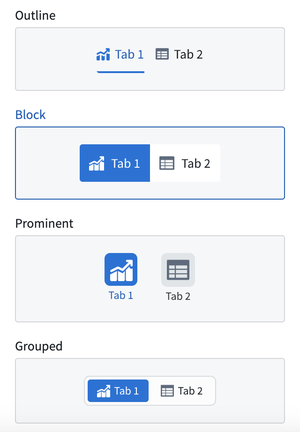
Tab preset options and previews.
Within each of the presets, application builders can unlock new capabilities by defining additional configuration preferences, including tab size. For example, the option to choose from small, medium, or large tabs can help enhance content readability, as well as enable the tabs to better accommodate other widgets. Tab size can also be used to create a nested effect, allowing application builders to establish a hierarchy amongst tabs.
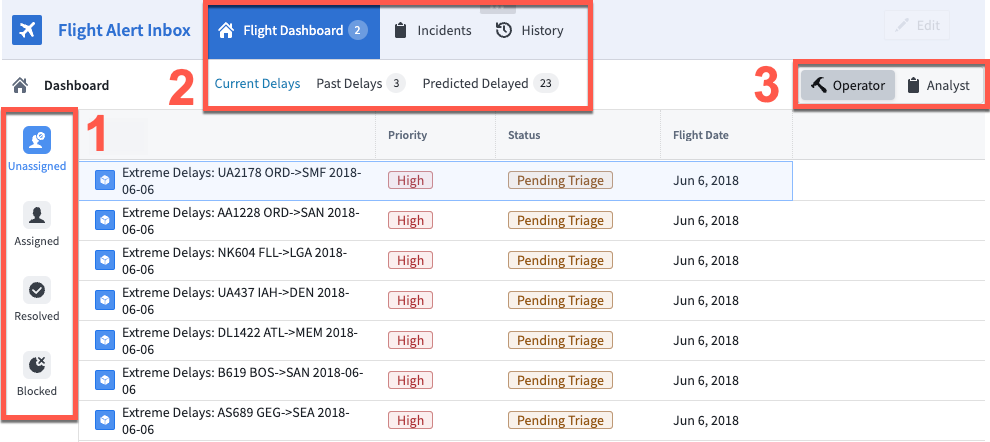
1. Prominent tabs, 2. Nested effect using various tab sizes, 3. Grouped tabs
Additional display and formatting settings for enhanced flexibility
Enhanced customization is now possible with newly added display and formatting settings, including:
- Color theming: Set a primary color for your tab and choose the color of different parts of the tab label, icon, and badge. This option can help create contrast with the container background, improving tab visibility for end users.
- Direction and alignment: Select to display tabs either horizontally or vertically. You may also justify your tabs to the left or center in relation to the tab container, which can help facilitate the overall document flow of widgets.
- Conditional visibility: Determine whether a tab should be visible, disabled, or entirely hidden using variables of your choice. This capability enables you to better hide or display information depending on the state of your application and user.
For more on the Tabs widget in Workshop, consult the updated documentation.
Introducing Media Sets, a new way to organize your unstructured media data
Date published: 2024-01-25
Media sets will be generally available on the week of 29 January 2024, enabling users to enhance workflow capabilities involving unstructured data.
A media set is a collection of media files of common schema designed to work with high-scale, unstructured data and to facilitate the complex processing of media items such as audio, imagery, and PDFs (with support for video coming soon). You can enhance your media workflows and pipelines by using media sets to enable access to flexible storage, compute optimizations, and schema-specific transformations. Optionally, you may also create virtual media sets that read directly from Azure or S3 external source systems and bypass onerous data transfer and storage logistics. Users of on-premise enrollments can enable access to the media sets feature through Palantir Support.
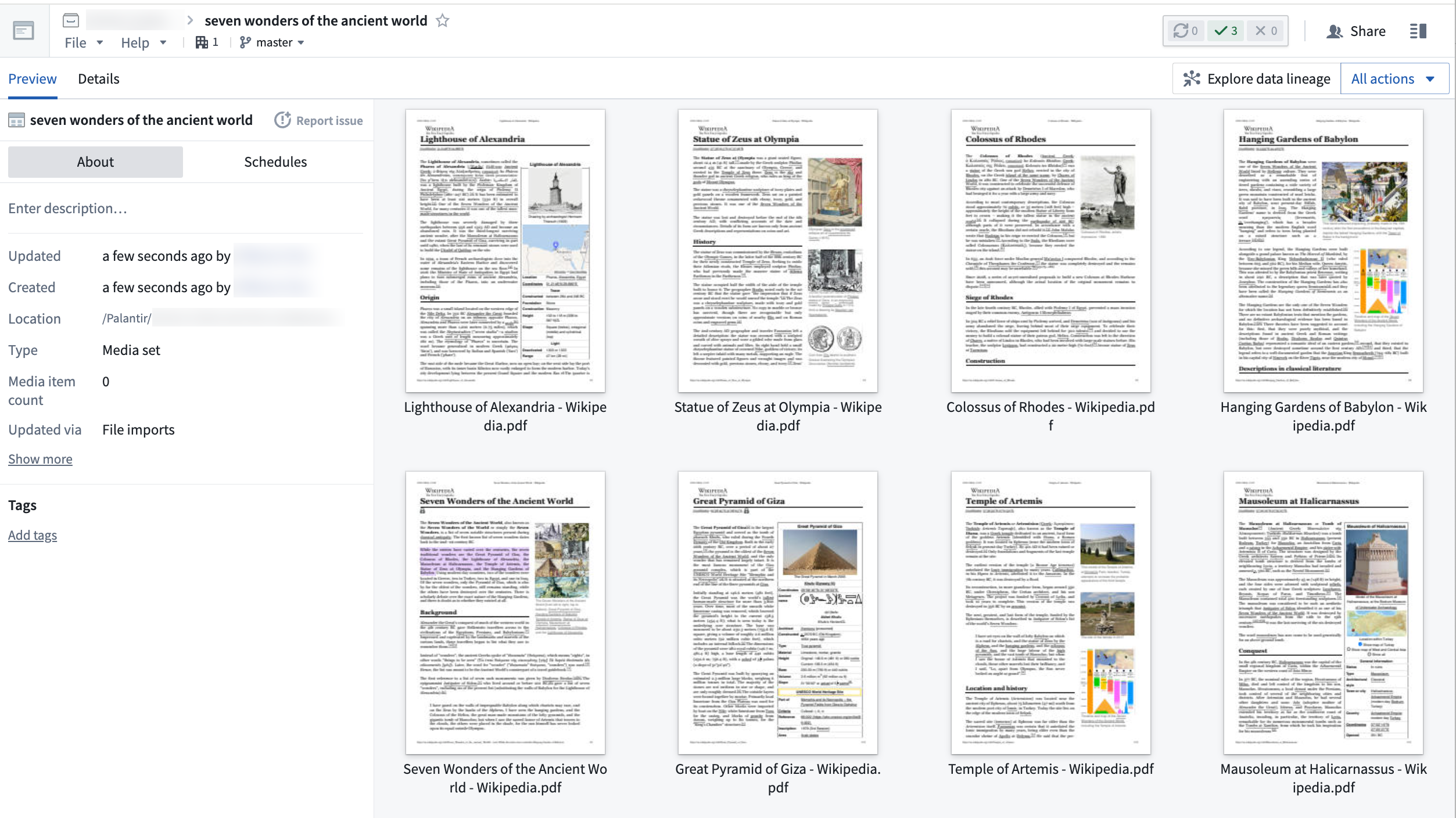
Media sets support the import of audio, imagery, and PDFs.
Versatile configuration setup for transformations
Media sets can be configured to your latency requirements either as with transactions, similar to a Catalog dataset, or transactionless where it is similar to a stream. Once setup, you can use a selection of the existing out-of-the-box transformations that can be leveraged in Transforms using the transforms-media SDK, with support for additional transformations in Pipeline Builder in active development.
Explore new workflows powered by media sets
The following are a list of sample workflows you can now accomplish with the introduction of media sets:
- PDF text extraction with Pipeline Builder: Easily build complex workflows with PDF sources using Pipeline Builder.
- Optimized thumbnail and platform preview: View uploads quickly and intuitively across the platform. File format normalization: Transcode more than 8 audio formats to MP3 simply by uploading files into an MP3 media set.
- Raster tiling in Vortex (TIFF, NITF): Upload your geospatial imagery and Ontologize using a media reference property, or simply use native tiling features in Vortex.
- DICOM image support: Preview DICOM files in media sets or Workshop apps without preprocessing in pipelines.
More information on media sets is available in our public documentation.
Introducing Workshop Routing [GA]
Date published: 2024-01-16
Workshop routing, now generally available, enables specific states or views of a module to be written to the URL, allowing users to easily share these defined views with others through link sharing.
When routing is enabled for a module, the ID of the current page will be written to the URL. The routing feature also offers support for writing the values of variables with an external ID to the URL.
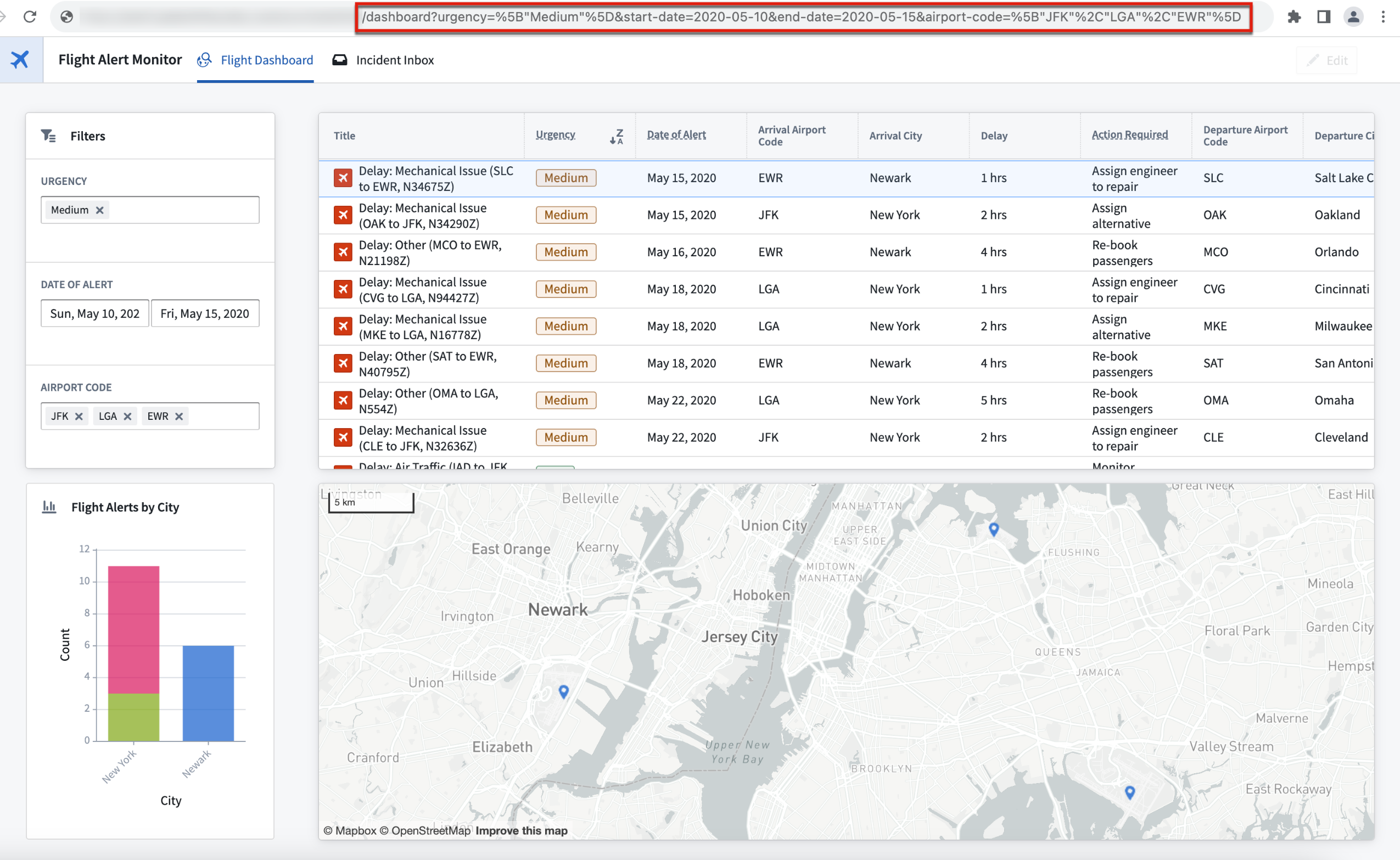
Example of routing shown in the URL bar in a user's browser.
To support routing, the promoted variable user interface has been updated to a variable settings panel that offers more information on how variables with a configured external ID can be used. In this Settings panel, application builders can configure which variables with external IDs to be present in the URL, and whether the external IDs should always be present, or only when used by a visible widget or layout in the current module view.
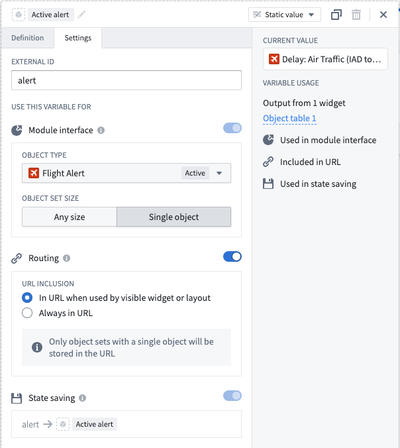
Routing section of the variable Settings panel.
For more information on how to use Workshop routing, review the Routing documentation.
TypeScript Functions on Objects (FoO) performance improvements in Code Repositories
Date published: 2024-01-16
We are excited to announce improvements to TypeScript Functions on Objects (FoO) authoring in Code Repositories. These updates result in significantly faster live preview loading times and checks, as well as enhanced responsiveness in the editor.
Function discovery in both Code Assist & CI checks now over 10 times faster
Code Repositories perform extensive analyses of TypeScript code to identify user-authored Functions, automatically detect read and edited object types, and flag potentially problematic patterns such as unsafe type casting. Live preview loading times and CI checks are now significantly faster as static analysis operations in the Function discovery workflow have been replaced with more efficient alternatives.
To illustrate, in a test repository consisting of more than 50,000 lines of TypeScript code with more than 3,000 Functions, Function discovery for TypeScript asset bundle version 0.527.0 took approximately 1.6 seconds compared to the previous 25 seconds runtime, making it 15.6 times faster.
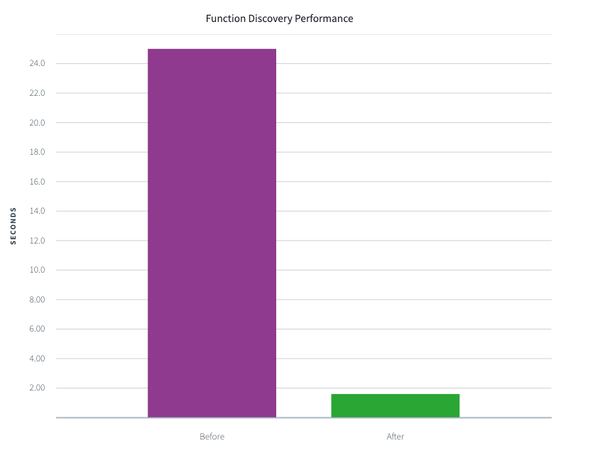
Function discovery before (25 seconds) and after (approx. 1.6 seconds) on a benchmarking repository.
To benefit from this increased speed, upgrade your repository to the latest version. Navigate to the ellipses at the top-right of the repository's window and select Upgrade.
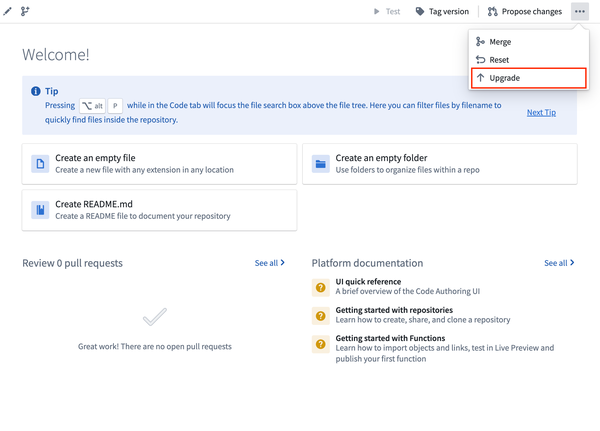
Upgrade your repository to experience faster preview loading times and CI checks.
More performant Code Assist TypeScript language server
Common language features, such as code complete, are now more efficient due to better handling of CPU-bound operations.
For context, the TypeScript language server actively processes each keystroke for autocompletions and error identification. In the past, outdated requests in large repositories created unnecessary, long-running child processes, making the system less responsive.
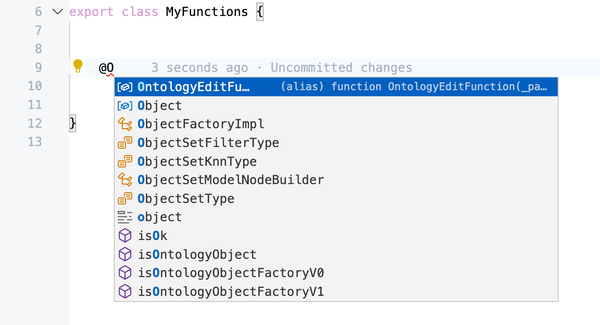
Autocompletion and error identification features by the TypeScript language server.
To address unnecessary processes, stale requests are now canceled, and several other optimizations have been implemented. As a result, the language server's efficiency has significantly improved, offering a more responsive and seamless experience for users on TypeScript language server version 0.188.0.
Learn more about Code Repositories in the documentation.
Introducing the AIP Agent widget
Date published: 2024-01-11
The AIP Agent widget, now available on AIP-enabled enrollments, is a Workshop feature that brings the power of AIP Logic, Functions, and LLM-powered Ontology exploration to your operational applications. Furthermore, by using Workshop variables, the widget can read from and write to your application state.
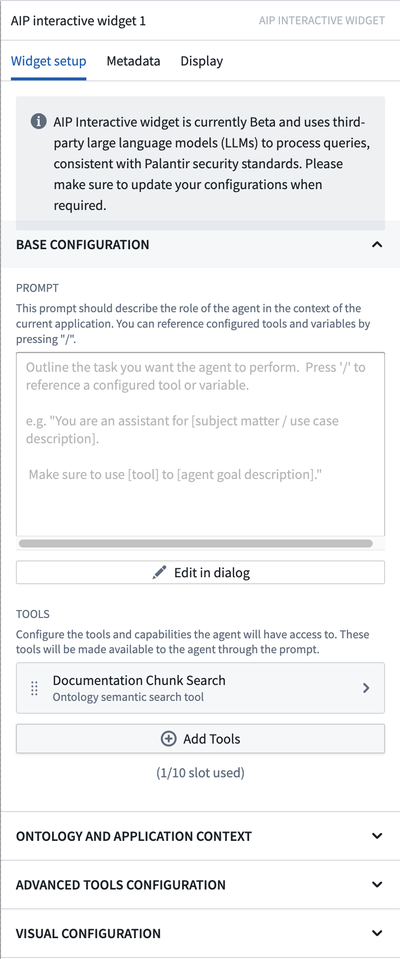
AIP Agent widget configuration panel.
Extend widget capabilities in the context of your application
You can grant the widget access to tools (AIP Logic, Functions on objects, other Workshop applications, and so on) to extend its capabilities in the context of your application. For example, you can define an LLM-backed Function in AIP Logic, add it as a tool, and see every run of the AIP Logic call from the Workshop application reflected in the debugger for review purposes.
Enable the Agent widget to understand user references and interact with visualizations
Like other Workshop widgets, you can save and read object sets in variables. Once configured, the Agent widget can interpret user-referenced topics and update a predefined object set variable, which can then be passed to other widgets in the Workshop application.
Employ default LLM tools to explore and traverse the Ontology
The widget also has standard LLM tools for traversing objects, reading and filtering on properties, and running aggregations. These tools can be managed from the widget's configuration panel.
White-label and customize the Agent widget to fit the context of your application
You can edit the zero state, add new logos, change the assistant name of the AIP Agent widget, and set up suggested prompts to customize the Agent widget for your intended workflow.
Robust configuration to support nuanced use cases
The AIP Agent widget comes with a robust suite of configuration options, including:
-
Define the widget's role, configure tools and capabilities, and set up prompts that reference tools and variables
-
This component allows you to establish the widget's role within the application context. Provide a prompt that describe the widget's function and refer to the configured tools and variables by their designated names using the
/command to refer to the tools and variables. The configuration also facilitates the setup of tools and capabilities the widget will have access to, and you can also refer to them throughout the prompt.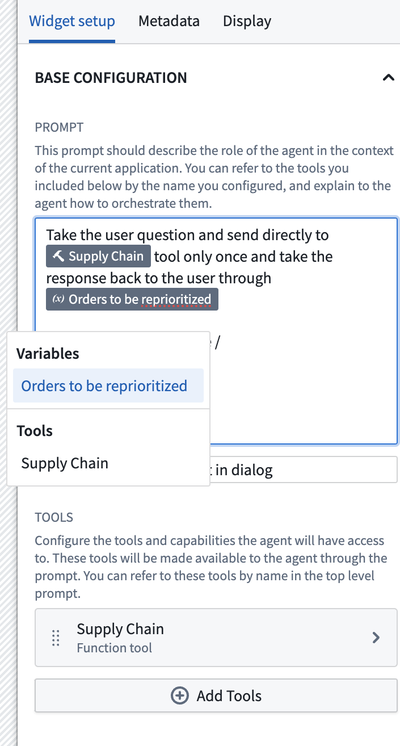
AIP Agent widget configuration panel with the base configuration and tools section populated.
-
-
Set up Ontology and application context
-
Customize the widget's access to workshop variables and configure the object types the widget should be aware of. Enable users to customize the AIP Agent widget's access to workshop variables for read or write operations. Users can also configure object types for the widget's awareness.
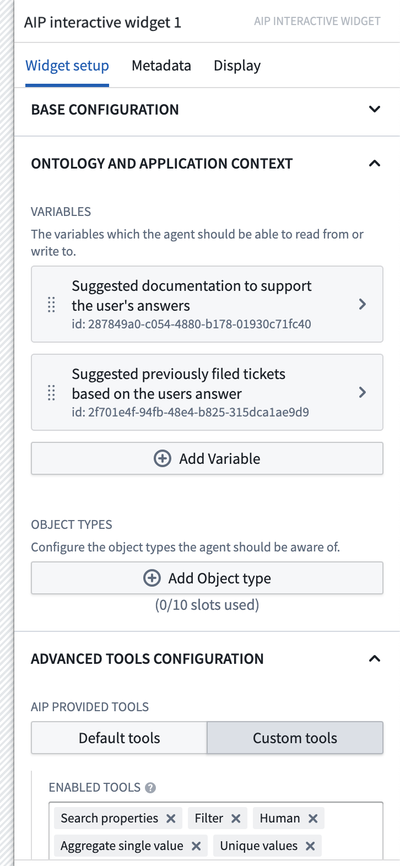
Managing Ontology and application context in the widget setup.
-
-
Advanced tools configuration
- Achieve greater control over default AIP tools by configuring LLM's access to them. This component offers an option to customize LLM's access to the default AIP tools, providing you with more control over their availability to the widget.
For more information, see the following documentation pages:
Auto migration of Checkpoints Admin users and groups to Data Governance Officer default role in Control Panel after January 31, 2024
Date published: 2024-01-09
The Checkpoints Admin role in Control Panel is being deprecated. Current Checkpoints admin workflows (configuring organization-scoped checkpoints and reviewing organization-scoped records) have already been granted to the Data Governance Officer default role in Control Panel, and after January 31, all users and groups assigned to the Checkpoints Admin role will be automatically migrated to the Data Governance Officer role.
When these users are migrated to the Data Governance Officer role, they will automatically be granted access to the current and future workflows assigned to that role. See the screenshot below for an overview of the current workflows. It is likely that Checkpoint Admins were already acting in some data governance capacity, so expanding their access to additional data governance workflows makes sense in most cases. Otherwise, you may create and define a custom role that mirrors the current Checkpoints Admin role’s permissions with the instructions provided below.
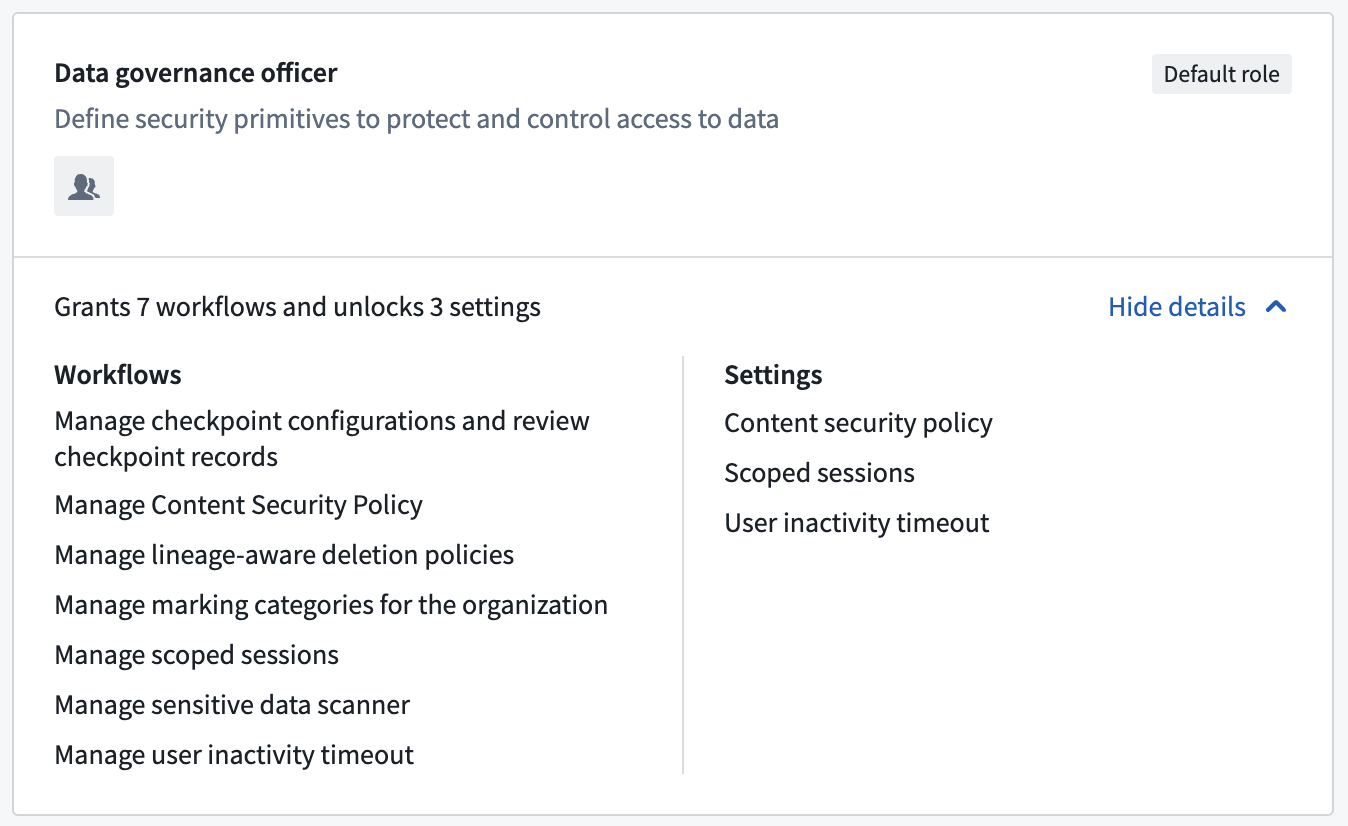
Existing DGO workflows and settings for reference.
Why is the Checkpoints Admin role being deprecated?
The Checkpoints Admin role is a legacy Administrative Permission role in Control Panel. These legacy roles are being phased out, in favor of default organization roles in order to improve the discoverability, legibility, and customizability of permission setups for platform administrators.
Checkpoints itself is a robust pillar of Foundry’s data governance product offerings, and as the Checkpoints Admin workflows are all related to data governance, they are most suitable to be held by Data Governance Officer default role.
Create and define a custom role that mirrors existing Checkpoints Admin permissions (optional)
Optionally, if you prefer not to migrate users from Checkpoints Admin to Data Governance Officer, follow the steps below to create a custom role for your Checkpoint admin users.
To start, you can review the workflows granted to the Data Governance Officer by navigating to Organization settings > Organization permissions > Data governance officer in Control Panel (as depicted in the first screenshot in this announcement).
If you do not want to migrate all Checkpoints Admin users into the Data Governance Officer role, you can define a custom role for Checkpoints admins and move your users there instead. This should take little time (~5 minutes).
- In Control Panel, go to Organization settings > Organization permissions .
- Create a new custom role by selecting New role.
- Grant this new role the Manage checkpoints configs and review checkpoint records workflow.
- Add all users and groups from the Checkpoints Admin application admin role to this new custom role. You can find these users and groups by going to Organization settings > Organization permissions > Application-specific roles > Checkpoints admin.
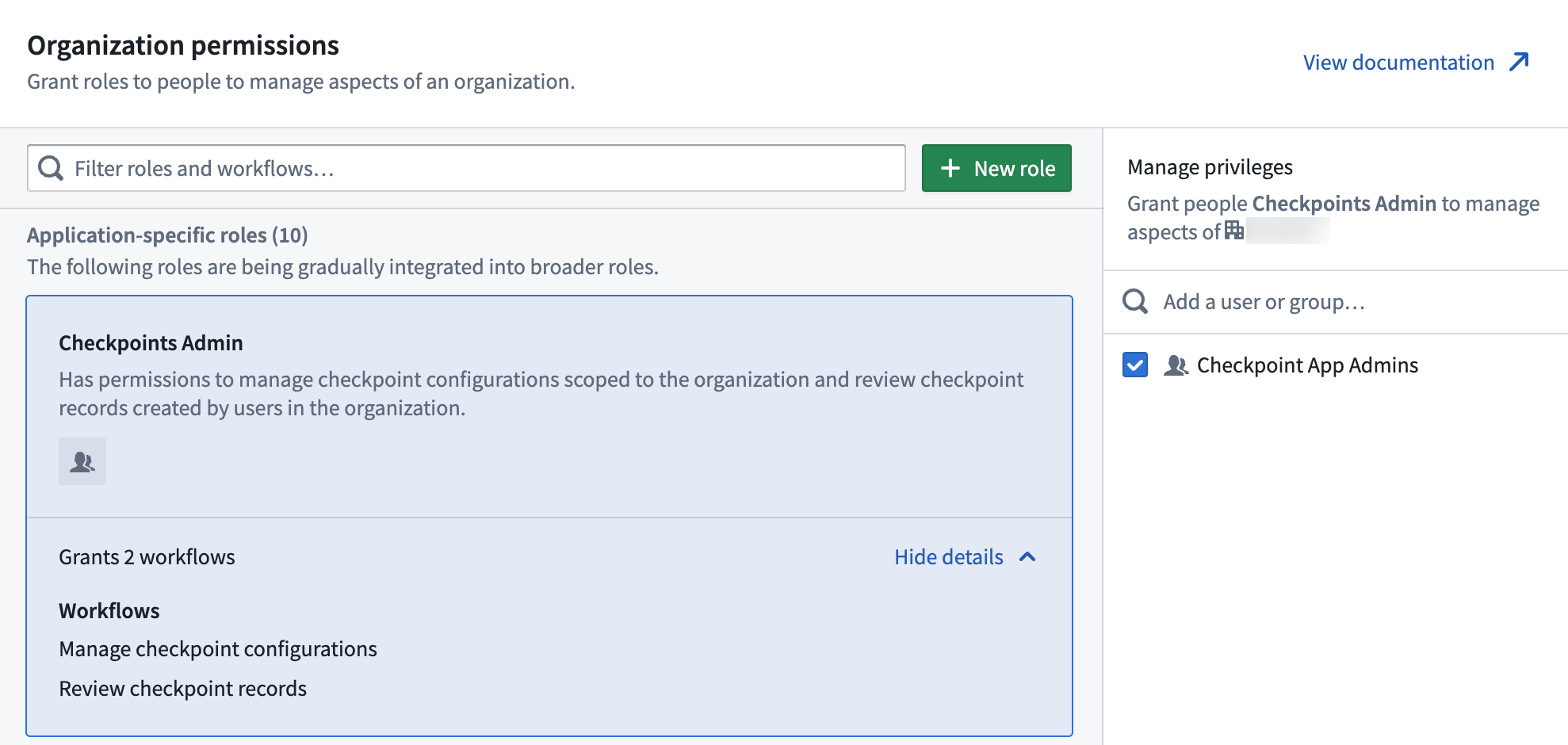
Organization permissions details for Checkpoints Admin role.
- ⚠️ Important: Remove all users and groups from the Checkpoints Admin Application-specific role! Any users or groups assigned to this role after January 31 will be automatically added to the Data Governance Officer role.
- For more information on the migration, see the following documentation pages:
Introducing Ontology API publishing using OpenAPI Specification
Date published: 2024-01-04
We are pleased to announce that Developer Console now supports Ontology API publishing in an OpenAPI YAML file, allowing developers to easily integrate their specific Ontology API with other systems that support OpenAPI Specification, such as Swagger.io ↗ or Postman ↗. With this update, connecting Ontology APIs with other systems is now even more streamlined and user-friendly.
Generate an OpenAPI Specification file
After creating your Developer Console application, use the SDK Generation tab to select the Export as OpenAPI option, as pictured below.
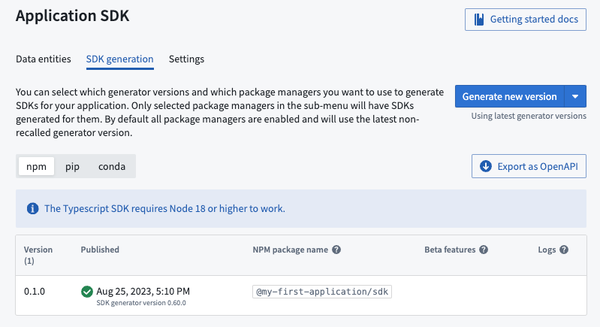
Select which generator versions and package manager to use on the SDK generation tab of Application SDK.
The generated file will include the name and description of any resource you included in your application. However, it will not include any data stored in these object types. Once saved to your computer, the file can be opened in any text editor or imported into your preferred tool, as illustrated in the image below.
Be aware that if the specification download is restricted, you should contact your Data Governance Officer to request access.
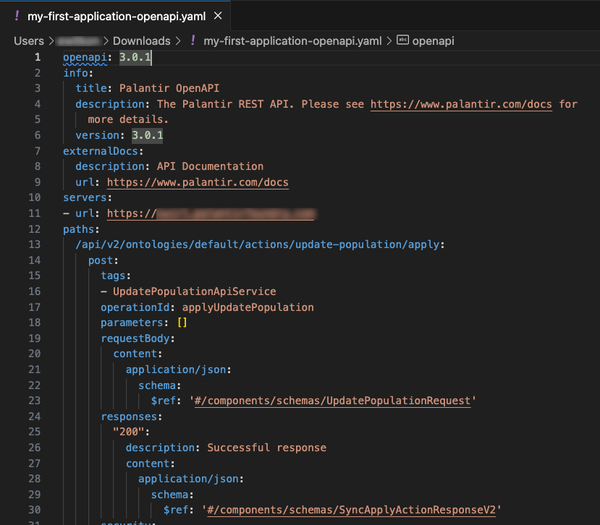
Example of exported Open API Specification file.
Keep in mind that a new specification file must be generated whenever the Developer Console application is updated.
Audit specification downloads
Data Governance Officers can configure a checkpoint specifically for OpenAPI exports. This checkpoint, named OpenAPI Export in the Checkpoint application, prompts users who select the Export as OpenAPI option with a confirmation dialog.
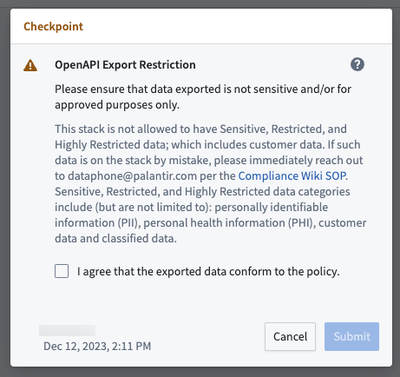
The OpenAPI Export checkpoint can be configured from the Checkpoint application.
As in the image above, users must acknowledge that they are exporting data from the platform before proceeding, and to confirm that the exported data conforms to their data policy.
For more information on using the Ontology SDK, review [the documentation](../ontology-sdk/overview.md.
Additional highlights
Model Asset
Date published: 2024-01-30
Preview Model Assets in Code Repositories | Model Assets now support preview in the Code Repositories application. This allows model developers to test model adapter, model training, and inference logic on selected, small scale data without waiting for repository checks, unit tests or a full build. This capability can significantly speed up development for models trained in-platform or backed by user-uploaded files.
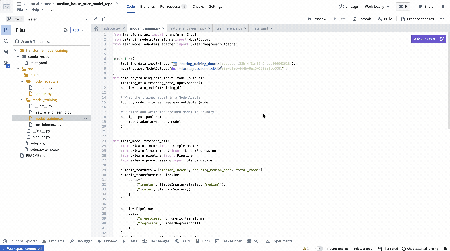
Security | Approvals
Date published: 2024-01-30
Approvals: Warning for request creators with limited access | Approvals now display a warning when the request creator cannot view the access request due to limited discovery permissions on the requested resource. This additional context can assist users in making informed decisions when approving requests.
Model Integration | Workspace
Date published: 2024-01-30
Enhanced clips and restricted views | Introducing an improved experience for working with clips and restricted views in Workspace. Users can now seamlessly manage and interact with their content.
Security| Approvals
Date published: 2024-01-30
Approvals: Support for editing access requests | Users with appropriate permissions can now edit open access requests in Approvals. This allows both the request creator and users with approval permissions to add or remove users from an open request.
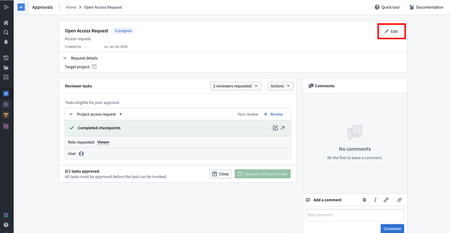
App Building | Workshop
Date published: 2024-01-30
FilterList V9 enhancements | This update introduces several improvements to the FilterList component, including the ability to order options in ascending or descending order for singleSelect and multiSelect, a resetOnSelect option for multiSelect, and adjustable chart height for histograms. Additionally, the multipassUser component now supports multi-select functionality, and singleSelect offers radio and dropdown display options.
Administration | Resource Management
Date published: 2024-01-30
Enhanced anomaly detection for compute usage | Detect anomalous patterns in compute usage with improved accuracy and efficiency. Automatically identify spikes, troughs, and flatlines to protect against runaway spend or validate specified data pipelines. Learn more in the Resource Management Anomaly Detection documentation.
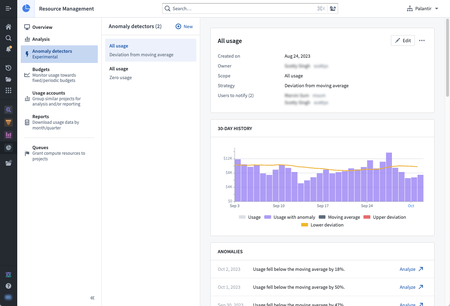
App Building | Workshop
Date published: 2024-01-30
Configure KNN Object Sets in Object Set Editor | The Object Set Editor now supports configuring KNN object sets, enabling easier semantic search workflow setups in Workshop.
App Building | Workshop
Date published: 2024-01-30
Improved PDF rendering in Adaptable Preview | Adaptable Preview now uses PdfRendererV2, the same renderer used in Workshop and Notepad, for improved PDF rendering and consistency across applications.
Ontology | Ontology Management
Date published: 2024-01-30
Enhanced staging dialog in Ontology Manager | The staging dialog in Ontology Manager has been redesigned to improve user experience and prepare for the upcoming separation of branches and proposals. Users can now save both with and without an edit, and the dialog will display the updated design.
Ontology | Ontology Management
Date published: 2024-01-30
Improved Ontology Manager redirects | Ontology Manager now automatically redirects users to the correct Ontology for object types and link types when no edits have been made.
Administration | Control Panel
Date published: 2024-01-30
Email suppressions now generally available | Email suppressions, a feature that displays when emails are stuck and cannot be sent to certain targets, is now generally available. This feature currently mirrors the underlying AWS suppressions list. If the stack is not using AWS (including BYOSMTP / PCloud), the suppressions view will be empty.
Data Integration | Code Repositories
Date published: 2024-01-25
Model Asset I/O Preview Enabled | Users can now preview model input and output data directly within the Code Repositories application. This enhancement provides a more convenient way to visualize and understand the data flow in your models.
Ontology | Ontology Management
Date published: 2024-01-25
Improved Datasource Diffs in Ontology Manager | Enhancements have been made to datasource diffs in Ontology Manager, including improved wording for datasource diff codes and rendering datasources instead of just displaying an RID.
Data Integration | Pipeline Builder
Date published: 2024-01-23
Deploy Without Build Feature for Pipeline Builder | Deploy without build is now available for batch and streaming pipelines in Pipeline Builder, allowing users to selectively deploy pipeline targets and publish jobspecs without running a full build. Choose individual builds or job groups as the build target. This reduces operational costs and unnecessary build time. When selectively building targets on a streaming pipeline, users can also optionally replay specific targets during deployment.
Data Integration | Job Tracker
Date published: 2024-01-23
Display Supported CPU Architectures in Job Tracker | The Job Tracker now displays supported CPU architectures for each job, making it easier for users to identify the appropriate architecture for their custom libraries. Users can force a job to run on a specific architecture using Spark profiles KUBERNETES_CPU_ARCHITECTURE_OVERRIDE_AMD64 and KUBERNETES_CPU_ARCHITECTURE_OVERRIDE_ARM64. Note that only a subset of environments has access to ARM architecture due to capacity or compliance concerns.
Security | Projects
Date published: 2024-01-23
Time-based Group Membership (Beta) | Introducing beta functionality for time-based group membership. Users can now be granted temporary access to data through time-constrained group memberships. Configure groups with time constraint conditions to ensure all memberships adhere to these conditions. Approval access requests against a group will also be constrained by the group's time constraint conditions. This feature supports data protection principles such as use limitation and purpose specification. Note that this functionality is in beta and may not be available in your enrollment. Contact Palantir Support to enable this feature.
Data Integration | Code Repositories
Date published: 2024-01-23
Improved External Transforms Performance with Lightweight Mode | External transforms now supports the @lightweight API, resulting in improved performance by reducing startup overhead. This enhancement is ideal for external transforms as they are typically not Spark dependent or CPU-intensive, leading to better latency and throughput.
App Building | Workshop
Date published: 2024-01-23
Configure Feature Exclusions for Promoted Variables | Builders can now enable a subset of features to use for variables with an external ID (previously called "promoted variables"). This update allows for more granular control over which features each variable is used for, improving the overall user experience when working with variables.
Security | Projects
Date published: 2024-01-16
Enhanced Markdown Support in Project Documentation | Foundry now supports Github-flavored markdown extensions, such as tables, todo lists, and automatic links, in project covers and documentation. This enhancement allows users to create more engaging and organized project documentation.
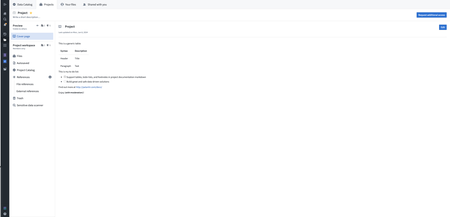
Ontology | Automate
Date published: 2024-01-16
Enhanced Attachment Property Injection | Users can now inject attachment properties from conditions into effects in Automate, supporting per-object execution. This enhancement streamlines the process of working with attachment properties and improves the overall user experience.
Model Integration | Modeling
Date published: 2024-01-09
Direct Publishing of Models in Function Registry | Live deployments in Modeling Objectives application can now be directly published as a function for consumption across Foundry. In comparison to functions on models, this enhancement offers a more streamlined, no-code method for operationalizing a model, while retaining the same benefits.
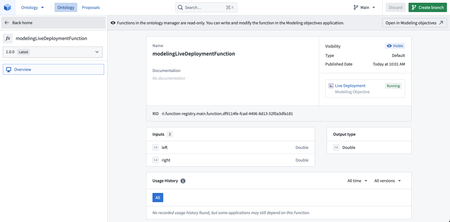
Administration | Control Panel
Date published: 2024-01-09
Enhanced CORS Configuration in Control Panel | Administrators can now configure CORS (cross-origin resource sharing) policies in the Control Panel, allowing specific external origins to access Foundry resources. This enhancement supports workflows such as accessing Foundry public APIs and integrating third-party applications.
Security | Projects
Date published: 2024-01-04
Add CBAC markings to user marking access section | For environments that use Classification-based Access Controls (CBAC), CBAC markings associated with a user are now shown in User settings under Marking access.
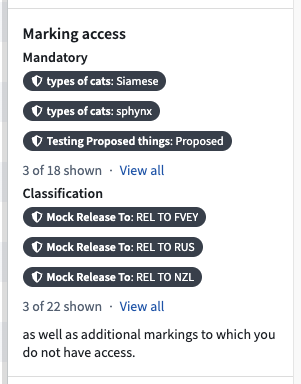
App Building | Workshop
Date published: 2024-01-04
Enhanced list parameter support in Workshop | Users can now pass promoted list variables between Workshop modules when embedded in a Carbon workspace, improving the flexibility and functionality of Workshop within Carbon.
Ontology | Ontology Management
Date published: 2024-01-04
Improved error message for invalid primary key references | The Ontology Manager now provides a clearer error message when users encounter the LinkTypeReferencesInvalidPrimaryKeyError while saving changes to the Ontology.
App Building | Workshop
Date published: 2024-01-04
Sortable Object Table title columns | Object Table title columns are now sortable, allowing users to easily organize and navigate through their data. This update enhances the user experience by providing a more efficient way to sort and manage object tables.